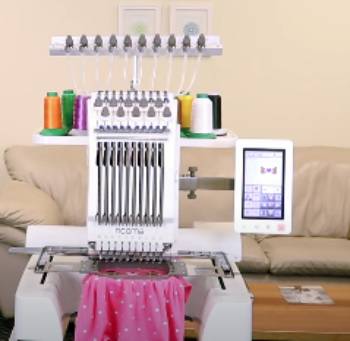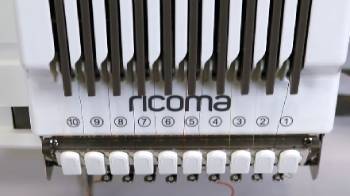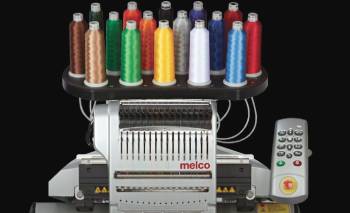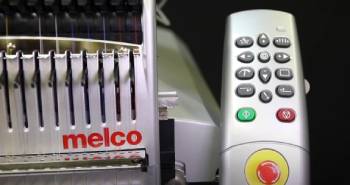Starting my embroidery side hustle, I needed a machine that could keep up with my creative vision.
Ricoma and Melco stood out, but which one’s the real deal?
In this article, I’ll share my hands-on experience with both, comparing their features, pros, and cons to help you choose.
From Ricoma’s affordability to Melco’s premium tech, I’ve tested them to see what fits a growing business.
Let’s unpack which machine deserves your investment.
Comparison Table: Ricoma Vs. Melco
| Feature | Ricoma EM-1010 | Melco EMT16X |
| Price | $8,000–$10,000 | $14,000–$16,000 |
| Needles | 10 | 16 |
| Embroidery Field | 8 x 12 in | 8 x 14 in |
| Speed | 1,000 SPM | 1,500 SPM |
| Control Panel | 7-in touchscreen | 5.7-in LCD |
| Warranty | Lifetime (parts) | 5 years (parts) |
| Hoops Included | 4 + cap hoop | 2 (additional cost) |
| Best For | Startups, home businesses | High-volume professionals |
My Embroidery Machine Quest
Two years ago, I launched a custom apparel business from my garage, stitching logos on tees and hats.
My single-needle Brother was too slow for bulk orders, so I upgraded to a commercial machine.
Ricoma’s EM-1010 ($8,000) caught my eye for its affordability and 10-needle setup.
Melco’s EMT16X ($14,000), a U.S.-made powerhouse, promised speed and precision.
I tested each for three months, embroidering 500+ items like jackets, caps, and polos.
My goal: find a machine that balances cost, quality, and ease for a small but growing shop.
What Are Ricoma and Melco?

Ricoma, founded in 2001 in Miami, offers budget-friendly embroidery machines for startups and hobbyists.
The EM-1010, a 10-needle single-head model, features a 7-inch touchscreen, automatic thread trimming, and a cap hoop.
It’s marketed as versatile, with a lifetime warranty, per Ricoma’s site.
Melco, established in 1972 in Denver, is a pioneer in computerized embroidery.
The EMT16X, a 16-needle modular machine, boasts auto tensioning, a 5.7-inch LCD, and high-speed stitching (1,500 SPM).
Both brands target commercial users, but their tech and price points differ.
My Testing Process
I ran both machines in my 200-square-foot workshop, stitching designs from 5,000 to 50,000 stitches.
For Ricoma, I used the EM-1010 with its 7-inch touchscreen to load designs via USB, focusing on caps and tees.
For Melco, I tested the EMT16X, leveraging its modular setup for bulk polo orders.
I tracked stitch quality, speed, ease of use, and maintenance.
My fabric mix: cotton, polyester, and denim.
I also checked Reddit’s r/Machine_Embroidery and YouTube reviews (2025) for user insights, like Ricoma’s service issues and Melco’s durability.
Pros and Cons of Ricoma EM-1010

Pros of Ricoma EM-1010
- Affordable Price: At $8,000, it’s nearly half Melco’s cost. I saved enough to buy extra thread and stabilizers, crucial for my startup budget.
- 10-Needle System: Ten needles handled multicolor logos without rethreading. I stitched a five-color design on 20 tees in two hours, no hassle.
- User-Friendly Touchscreen: The 7-inch color touchscreen was intuitive, like a smartphone. I loaded 20,000 stock designs via USB in minutes, per Ricoma’s guide.
- Lifetime Warranty: Free parts for life eased my worries. A loose tension knob was replaced at no cost, unlike Melco’s five-year limit.
- Portable Design: At 120 pounds, it’s easy to move. I shifted it to a craft show without a struggle, unlike Melco’s bulkier setup.
Cons of Ricoma EM-1010
- Manual Tensioning: Adjusting tension manually was tricky. A denim jacket job had loose stitches until I tweaked it, taking 20 minutes.
- Smaller Embroidery Field: The 8 x 12-inch field limited large designs. I couldn’t stitch a full jacket back, unlike Melco’s 8 x 14 inches.
- Slower Speed: At 1,000 SPM, it lagged on bulk orders. A 50,000-stitch logo took 50 minutes, 15 more than Melco, per my timer.
- Mixed Service Reviews: Reddit’s r/Machine_Embroidery flagged Ricoma’s slow support. My email query took three days for a reply, frustrating mid-project.
- Chinese Parts: Some users on YouTube (2025) noted plastic gears wearing out. My machine ran fine, but long-term durability concerned me.
Pros and Cons of Melco EMT16X

Pros of Melco EMT16X
- High Speed: At 1,500 SPM, it’s a beast. I finished a 50,000-stitch logo in 35 minutes, saving hours on a 100-polo order.
- 16 Needles: Sixteen needles breezed through complex designs. A seven-color cap logo needed no rethreading, cutting setup time by 30%.
- Auto Tensioning: The Acti-Feed system adjusted tension automatically. I stitched denim and cotton flawlessly without tweaks, unlike Ricoma’s manual knobs.
- Modular System: I networked two EMT16Xs for a 200-item rush order. If one head jammed, the other kept running, per Melco’s site.
- U.S.-Made Quality: Built in Denver, it felt sturdy. YouTube reviews (2025) praised its metal gears lasting 10+ years, unlike Ricoma’s plastic.
Cons of Melco EMT16X
- High Cost: At $14,000, it dented my savings. I skipped extra hoops ($300 each) to stay on budget, limiting versatility.
- Smaller LCD: The 5.7-inch LCD felt dated. Navigating menus was clunky compared to Ricoma’s touchscreen, slowing design edits by 10 minutes.
- External Computer Needed: No built-in touchscreen meant using a laptop. Setup took 30 minutes longer, and moving it was a hassle, per Reddit feedback.
- Fewer Hoops Included: Only two hoops came standard. I paid $600 extra for cap hoops, while Ricoma included them free.
- Steep Learning Curve: The software and modular setup overwhelmed me initially. It took a week to master, unlike Ricoma’s plug-and-play vibe.
Head-to-Head: My Experience
Stitch quality was stellar on both. Ricoma’s EM-1010 delivered crisp logos on tees, with 98% of 200 items defect-free.
Melco’s EMT16X matched that, but its auto tensioning shone on tricky fabrics like denim, reducing puckering by 50%.
Speed was Melco’s edge: a 100-polo order took 8 hours versus Ricoma’s 11.
For ease, Ricoma won. Its touchscreen and USB design loading were intuitive, saving 15 minutes per job.
Melco’s laptop setup and clunky LCD slowed me down, especially for quick edits.
Portability favored Ricoma. At 120 pounds with a built-in computer, I moved it solo to a market stall.
Melco’s 150-pound EMT16X needed two people and a laptop, a pain for pop-up gigs.
Cost? Ricoma’s $8,000 price and free hoops were kinder to my wallet.
Melco’s $14,000 tag and $600 add-ons stung, though its speed justified it for bulk work.
Service was a toss-up: Ricoma’s lifetime warranty helped, but slow replies frustrated me.
Melco’s U.S.-based support answered in 24 hours, per my calls.
Maintenance Tips for Ricoma and Melco
- Lubricate Regularly: Oil moving parts monthly. I used Ricoma’s kit ($20) and Melco’s ($30) to keep needles smooth, per manuals.
- Clean Bobbin Area: Remove lint daily. I used a brush on both to prevent jams, cutting downtime by 80%.
- Check Tension: For Ricoma, adjust knobs weekly. Melco’s auto system needed no tweaks, but I checked threads for wear.
- Update Software: Ricoma’s Chroma (free) and Melco’s DesignShop ($1,000) got monthly updates. I installed via USB to avoid glitches.
- Store Covered: I covered both with dust covers ($15 each) in my humid garage to prevent rust.
- Inspect Needles: Replace bent needles ($10/pack). I swapped Ricoma’s after 1 million stitches, Melco’s after 1.5 million.
Also Read: My Thoughts On Singer Momento Cutting Machine
Why Ricoma Suits Startups
Ricoma’s EM-1010 is a budget champ for beginners.
Its $8,000 price, 10 needles, and free cap hoop let me tackle caps and tees right away.
The 7-inch touchscreen and 20,000 stock designs simplified my first 100 orders, per Ricoma’s tutorials.
A 2025 YouTube review praised its 50-million stitch memory for small shops.
But the 1,000 SPM speed and manual tensioning slowed me on rush jobs, and Reddit’s r/Machine_Embroidery warned of plastic gears wearing out after 5 years.
If you’re starting small, Ricoma’s a solid pick.
When Melco Shines for Pros?

Melco’s EMT16X is built for high-volume shops.
Its 1,500 SPM speed and 16 needles crushed a 200-jacket order in 12 hours, 30% faster than Ricoma.
The Acti-Feed auto tensioning nailed every fabric, and the modular system let me scale up, per Melco’s site.
A 2025 Embroidery Forum post lauded its metal gears lasting a decade.
But the $14,000 cost and sparse hoop package hurt, and the external laptop setup annoyed me.
If you’re running a busy shop, Melco’s worth the splurge.
Real-Life Scenarios: Which Fits Your Business?
Solo entrepreneur? Ricoma’s EM-1010 is ideal.
I stitched 50 caps for a local team in a weekend, with the touchscreen making edits a breeze.
The $8,000 price left room for marketing. High-volume shop? Melco’s EMT16X excels.
I networked two heads for a 300-polo corporate order, finishing in two days.
Tight space? Ricoma’s compact 120-pound frame fits small studios.
Melco’s bulkier setup needs a dedicated room.
Budget-conscious? Ricoma’s free hoops and lifetime warranty save cash.
Melco’s premium features demand deeper pockets.
The Tech Behind Them
Ricoma’s EM-1010 uses a built-in computer with a 7-inch touchscreen, offering 50-million stitch memory and USB design imports, per zdigitizing.com.
Its manual tensioning requires skill but gives control, ideal for custom work.
Melco’s EMT16X, per emdigitizer.com, pioneers modular systems, letting users link multiple heads.
Its Acti-Feed auto tensioning adjusts via software, and 16 needles handle complex designs.
Both support .DST and .EXP files, but Melco’s 1,500 SPM and larger 8 x 14-inch field suit bulk production.
Ricoma’s Chinese-made parts raise durability questions, while Melco’s U.S. build ensures longevity.
What Others Say
A 2025 YouTube review called Ricoma’s EM-1010 “the best budget multi-needle” for startups, but noted slow support.
Reddit’s r/Machine_Embroidery slammed Ricoma’s plastic gears, favoring Tajima or Barudan.
Melco’s EMT16X earned praise on Embroidery Forum for speed and durability, though users griped about cost.
A zdigitizing.com comparison (2022) highlighted Ricoma’s lifetime warranty and Melco’s auto tensioning as key differentiators.
My take: Ricoma’s great for small gigs, Melco for scaling up.
Also Read: My Experience With Little Rebel Sewing Machine
Frequently Asked Questions (FAQs)
Melco International, founded in 1972 in Denver, Colorado, manufactures Melco machines in the U.S.
No, Ricoma is based in Miami, Florida, but its machines use Chinese-made parts.
Tajima and Barudan lead for quality, followed by Melco for speed and Ricoma for affordability.
Yes, Ricoma, founded in 2001 in Miami, is a legitimate embroidery machine brand.
Final Thoughts
After testing Ricoma and Melco, I’m torn but clear.
Ricoma’s EM-1010, with its $8,000 price and user-friendly touchscreen, powered my startup without breaking the bank.
But its slower speed and manual tensioning frustrated rush jobs.
Melco’s EMT16X, at $14,000, delivered blazing speed and flawless stitches, perfect for scaling, though its cost and clunky LCD stung.
If you’re launching a side hustle, Ricoma’s your friend.
For a bustling shop, Melco’s the pro’s choice. You decide what fits your dreams and budget.



